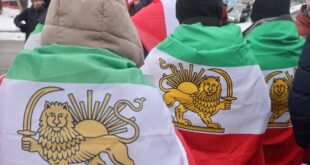 TEHRAN (FNA)- Iran said on Wednesday that talks on its nuclear drive with top UN atomic watchdog official Olli Heinonen were “positive” and would continue.
TEHRAN (FNA)- Iran said on Wednesday that talks on its nuclear drive with top UN atomic watchdog official Olli Heinonen were “positive” and would continue.
“The negotiations held over the past three days were positive and will continue,” said the deputy chief of Iran’s Atomic Energy Organization, Mohammad Saeedi.
“The two sides have agreed to continue these discussions,” he added.
International Atomic Energy Agency (IAEA) deputy chief Heinonen arrived in Tehran on Monday for a second round of talks with Iranian officials this month.
The UN nuclear watchdog official was expected to leave Iran late Wednesday.
Ali Asghar Soltaniyeh, Iran’s representative at the IAEA, meanwhile, said that “negotiations… on technical cooperation between Iran and the IAEA will continue.”
Heinonen has made a number of visits within the framework of Iran-IAEA cooperation.
The United States and its Western allies accuse Iran of trying to develop nuclear weapons under the cover of a civilian nuclear program, while they have never presented any corroborative document to substantiate their allegations. Iran denies the charges and insists that its nuclear program is for peaceful purposes only.
Tehran stresses that the country has always pursued a civilian path to provide power to the growing number of Iranian population, whose fossil fuel would eventually run dry.
The UN nuclear watchdog has so far carried out at least 14 surprise inspections of Iran’s nuclear sites, but found nothing to support West’s allegations.
Heinonen’s latest trip – which comes ahead of a new IAEA report on Iran expected in September – follows on August 7 talks in Tehran that Iranian officials had also described as “positive”.
The visit comes as US is seeking to convince its allies to endorse a fourth set of sanctions against Iran after Tehran said that it would provide a clear response to an incentives package offered by six major world powers after certain ambiguities existing in the proposals are removed by the other party.
Iran is under three rounds of UN Security Council sanctions for turning down West’s calls to give up its right of uranium enrichment, saying the demand is politically tainted and illogical.
Iran has so far ruled out halting or limiting its nuclear work in exchange for trade and other incentives, saying that renouncing its rights under the NPT would encourage world powers to put further pressure on the country and would not lead to a change in the West’s hardline stance on Tehran.
Iran insists that it will continue enriching uranium because it needs to provide fuel to a 300-megawatt light-water reactor it is building in the southwestern town of Darkhoveyn as well as its first nuclear power plant in the southern port city of Bushehr.
Iran has repeatedly said that it considers its nuclear case closed after it answered the UN agency’s questions about the history of its nuclear program.
Meantime, Iran says that as a signatory to the nuclear Non-Proliferation Treaty (NPT) it is fully committed to dialogue to protect its right to the peaceful application of nuclear technology, but that it will not accept Western demands of bringing its nuclear activities to a halt.
Political analysts believe that the United States has remained at loggerheads with Iran over the independent and home-grown nature of Tehran’s nuclear technology, which gives the Islamic Republic the potential to turn into a world power and a role model for other third-world countries. Washington has laid much pressure on Iran to make it give up the most sensitive and advanced part of the technology, which is uranium enrichment, a process used for producing nuclear fuel for power plants.
Washington’s push for additional UN penalties contradicts the report by 16 US intelligence bodies that endorsed the civilian nature of Iran’s programs. Following the US National Intelligence Estimate (NIE) and similar reports by the IAEA head – one in November and the other one in February – which praised Iran’s truthfulness about key aspects of its past nuclear activities and announced settlement of outstanding issues with Tehran, any effort to impose further sanctions on Iran seems to be completely irrational.
The February report by the UN nuclear watchdog, the International Atomic Energy Agency, praised Iran’s cooperation in clearing up all of the past questions over its nuclear program, vindicating Iran’s nuclear program and leaving no justification for any new UN sanctions.
Observers believe that the shift of policy by the White House to send William Burns – the third highest-ranking diplomat in the US – to the latest round of Iran-West talks happened after Bush’s attempt to rally international pressure against Iran lost steam due to the growing international vigilance.
US President George W. Bush finished a tour of the Middle East in winter to gain the consensus of his Arab allies to unite against Iran.
But hosting officials of the regional nations dismissed Bush’s allegations, describing Tehran as a good friend of their countries.
Many world nations have called the UN Security Council pressure against Iran unjustified, especially in the wake of recent IAEA reports, stressing that Tehran’s case should be normalized and returned to the UN nuclear watchdog due to the Islamic Republic’s increased cooperation with the agency.
 Eurasia Press & News
Eurasia Press & News



